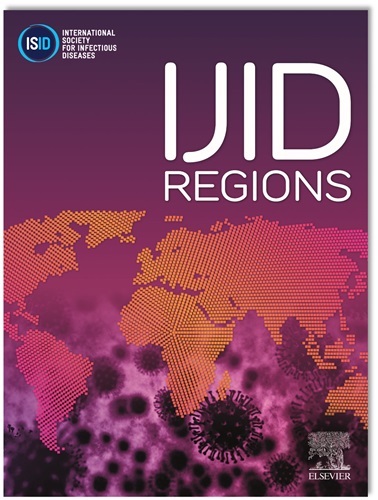Assessing Antimicrobial Stewardship: A Survey of Distribution Practices in Dispensaries in Ghana
IF 4.8
2区 医学
Q1 INFECTIOUS DISEASES
引用次数: 0
Abstract
Introduction
The extent of antimicrobial stewardship practices remains uncertain in Ghana, a context where health care frequently takes place at the community level, and in private sector entities. Private medicine vendors have previously been identified as disproportionate drivers of antimicrobial misuse fueling the emergence of antimicrobial-resistant pathogen outbreaks. This study sought to assess antimicrobial distribution in dispensaries in Accra, Ghana, to determine patterns in risk for antimicrobial misuse.
Methods
A 72-question survey questionnaire explored the backgrounds, behaviors, and medicine dispensation patterns of dispensaries’ staff (shopkeepers). The survey also assessed economic indicators of the surrounding community, alongside an inventory of sales trends, prices, medications, and neighborhood-level socioeconomic condition. The survey was conducted with 83 pharmacies and chemical shops.
Results
We found that the type of medication most relied upon varied by location. The frequency of antibiotic and antimalarial sales varied widely, with average estimates that antibiotics represented 27% of sales in pharmacies. A majority of respondents asserted that medical decision-making is primarily navigated based on the amount of money on hand for a customer. Shopkeepers exercised a variety of strategies to respond to customers' insufficient funds, the most central of which was a practice of offering progressively lower-cost, generic-brand medicines. Misuse of antimicrobials appears to be relatively limited, but may still occur via over-prescription, unqualified dispensing practices, and the use of subtherapeutic quantities of antibiotics. Over 50% reported occasionally selling incomplete treatment courses to customers unable to pay for an entire course at once.
Discussion
Respondents revealed an overall intention to judiciously guard antibiotics, but a lack of systemic interventions, given competing forces. Key findings suggested that middle-income neighborhoods faced the highest risk of antimicrobial overuse, driven by patient-level expectations, mixed economic access, and weaker stewardship practices by shopkeepers. The findings of this study offer a more recent and detailed outlook on antimicrobial use than prior works in this context.
Conclusion
Shopkeepers' understanding of clients' preferences and disincentives for purchase can inform interventions in the scope of user behaviors. Expanding the diagnostic, health surveillance, and treatment capacity of shopkeepers shows promise for public health interventions seeking to improve stewardship of antimicrobials at the community level.
评估抗菌剂管理:加纳药房分配实践的调查
在加纳,卫生保健往往在社区一级和私营部门实体中进行,因此抗菌剂管理做法的程度仍然不确定。私人药品供应商先前已被确定为过度滥用抗菌素的驱动因素,助长了抗菌素耐药性病原体暴发的出现。本研究旨在评估加纳阿克拉药房的抗菌药物分布情况,以确定抗菌药物滥用风险的模式。方法采用72道问卷调查法,对药房工作人员(店主)的工作背景、行为及配药方式进行调查。该调查还评估了周边社区的经济指标,以及销售趋势、价格、药物和社区社会经济状况的清单。这项调查是在83家药店和化工店进行的。结果我们发现,最依赖的药物类型因地区而异。抗生素和抗疟药的销售频率差异很大,平均估计抗生素占药店销售额的27%。大多数受访者声称,医疗决策主要是根据客户手头的资金数量来进行的。店主们采取了各种各样的策略来应对顾客资金不足的问题,其中最核心的是逐步提供成本更低的非专利品牌药品。滥用抗菌素似乎相对有限,但仍可能通过过度处方、不合格的配药做法和使用低于治疗量的抗生素而发生。超过50%的人报告说,偶尔会把不完整的疗程卖给无法一次性支付整个疗程的客户。讨论受访者透露审慎地保护抗生素的总体意图,但缺乏系统性干预,考虑到竞争力量。主要研究结果表明,中等收入社区面临着抗生素过度使用的最高风险,这是由患者层面的期望、混合的经济渠道和店主较弱的管理实践所驱动的。这项研究的结果提供了一个最新的和详细的前景抗菌药物的使用比以前的工作在这方面。结论店主对顾客购买偏好和购买抑制因素的了解可以为在用户行为范围内的干预提供信息。扩大店主的诊断、健康监测和治疗能力,为寻求改善社区一级抗微生物药物管理的公共卫生干预措施带来了希望。
本文章由计算机程序翻译,如有差异,请以英文原文为准。
求助全文
约1分钟内获得全文
求助全文
来源期刊
CiteScore
18.90
自引率
2.40%
发文量
1020
审稿时长
30 days
期刊介绍:
International Journal of Infectious Diseases (IJID)
Publisher: International Society for Infectious Diseases
Publication Frequency: Monthly
Type: Peer-reviewed, Open Access
Scope:
Publishes original clinical and laboratory-based research.
Reports clinical trials, reviews, and some case reports.
Focuses on epidemiology, clinical diagnosis, treatment, and control of infectious diseases.
Emphasizes diseases common in under-resourced countries.

 求助内容:
求助内容: 应助结果提醒方式:
应助结果提醒方式:


